Written by: Thejaswini M A
Translated by: Block unicorn
Preface
The boxes at the Ring distribution center didn’t pack themselves, but 16-year-old Luca Netz was always distracted. Around him, colleagues were completing their shifts efficiently and skillfully. But Netz was focused on how to turn a startup into a billion-dollar acquisition.
He dropped out of school for this warehouse job, spending most of his childhood sleeping in any place his mother could find, and now he witnessed how a company genuinely creates wealth.
This experience made him understand how startups scale, how they consume capital, and how they struggle to survive to achieve escape velocity.
Years later, when Netz bet $2.5 million on a group of cartoon penguins that most considered worthless, this lesson proved invaluable. Today, those penguins sit on the shelves of Walmart, and the once-homeless Los Angeles boy is now one of the most influential builders in the cryptocurrency space, worth over $100 million at age 25.
'We were homeless for about ten years,' Netz recalls calmly. 'We lived all over the world, from South Africa to Paris, London, New York, and Los Angeles. As long as my mom could muster the courage, we lived like that.'
The Growth of a Scam
Netz's mother, an undocumented immigrant from France who could barely speak English, struggled to find stable work. They moved constantly, living with friends, acquaintances, and sometimes even strangers willing to temporarily take them in. For young Luca, home was wherever they happened to sleep that week.
Most people would consider such a growth experience a hindrance. Netz learned to see it as an education. The constant displacement taught him adaptability. Uncertainty trained him to spot opportunities that others overlooked. Hunger taught him to act quickly when opportunities arise.
By middle school, Netz discovered a simple truth: his classmates were willing to pay more for convenience rather than walk to Burger King. So, he started buying chicken sandwiches and snacks and then reselling them at a markup from his backpack. Simple math, but very effective.
When Netz was twelve, his family finally settled in central Los Angeles. There, he first tasted what it meant to settle down. The constant moving stopped, at least for a few years.
At sixteen, Netz dropped out of high school and printed a hundred resumes. Then, he walked the tech streets of Santa Monica, visiting every startup he could find, as if campaigning for something.
Ring hired him. That was in 2015, when the smart doorbell company had only twenty employees and grand dreams. Netz started in the warehouse—packing boxes, handling orders—work that most people wouldn’t think much about. But he was focused on things far beyond that: funding rounds, hiring sprees, and how to solve (or not solve) problems.
He witnessed Ring grow from an unassuming startup to a billion-dollar acquisition target for Amazon. As he packed boxes, venture capital poured in. As he handled orders, the company scaled. He received startup mechanics education that typical mainstream MBA programs cannot provide.
'I was able to witness a company go from raising a million dollars to becoming a billion-dollar company,' Netz recalled.
Gold Chain Epiphany
While working at Ring, 16-year-old Netz began to notice a strange phenomenon in hip-hop culture. Rappers would spend tens of thousands or even hundreds of thousands of dollars on gold chains and diamond jewelry. But upon closer observation, he found that most fans couldn’t distinguish a $100,000 gold chain from a $200 gold-plated replica.
This observation became the foundation of his first real business. Netz found suppliers for gold-plated chains and cubic zirconia diamonds that looked almost identical to the expensive versions. He then devised a simple yet clever marketing strategy: he would pay $50 to $100 to popular rappers' fan pages to promote his jewelry.
'Every time I paid them, they posted my promotion, and we made back $1,000 to $2,000 or even $5,000 each time,' he recalls. The return on investment was so high that he could immediately reinvest the profits and expand aggressively.
Nine months after launching a dropshipping business on Shopify, Netz achieved his first million-dollar revenue. He was 18 at the time. Ultimately, he sold the jewelry business for $8 million, providing him with capital to pursue larger goals.
With money from the bank, Netz began to diversify, leveraging his social media marketing experience gained in the jewelry business. He became the Chief Marketing Officer of the iconic clothing brand Von Dutch, gaining experience in managing established brands.
He then became the Chief Marketing Officer and main investor of Gel Blaster, a toy company that produces Orbeez-based toy guns. Under his marketing leadership, Gel Blaster achieved significant market success, being dubbed 'North America's fastest-growing toy company' by industry publications.
But the universe had prepared something cuter for him.
Penguin Rescue
At the beginning of 2022, the NFT market was still riding high from the previous year's explosion. Digital artworks sold for millions, celebrities changed their avatars to cartoon apes, and new projects launched daily, promising to build the next Disney.
One of these was Pudgy Penguins, a series containing 8,888 cartoon penguin NFTs that attracted attention with its cute designs and strong community. But by January 2022, the project was in crisis. The initial founders had overpromised and underdelivered, and the roadmap projects were unfulfilled. There were allegations of mismanagement, and community trust collapsed.
On January 6, 2022, the community voted to oust the initial founders. On the same day, Netz publicly proposed on Twitter to buy the entire Pudgy Penguins series and its intellectual property for 750 ETH (approximately $2.5 million at the time).
This was not an easy decision. The acquisition occurred just a week before the NFT market entered a two-year bear market. Netz and his executive team raised funds for the acquisition and worked without pay for a year while reinvesting $500,000 of their own money to keep the project alive.
What attracted him was the potential to build a lasting brand. 'If I can’t imagine Pudgy Penguins becoming a billion-dollar brand with my eyes closed, I would never buy it,' he says.
Beyond Digital Collectibles
Most people thought Netz would flip Pudgy Penguins, cash out, drive up the floor price, and then sell to the next buyer. However, he completely ignored the NFT market.
Under the leadership of Igloo Inc., Pudgy Penguins became an unprecedented brand: a crypto brand that operates in the real world. Netz established six revenue streams: digital experiences, physical products, licensing deals, content creation, film development, and gaming. These penguins are no longer just avatars but characters in a larger story.
The strategy for physical products initially seemed crazy. Would cryptocurrency enthusiasts buy cartoon penguin plush toys? But Netz's target was not crypto enthusiasts, but parents at Walmart.
Each plush toy comes with a QR code that guides buyers into 'Pudgy World,' a digital space where users can obtain a crypto wallet and claim NFT wearable gear.
Pudgy World is a free 3D browser game where players can customize their penguin avatars, using their NFTs and physical toys to explore a virtual world, seamlessly integrating Web3 ownership with easy-to-learn gameplay. Parents think they are buying a plush toy for their children, but in reality, they are unwittingly stepping into Web3.
The success of this strategy surprised everyone. Pudgy Penguins toys are now on the shelves of Walmart, Target, Chuck E. Cheese, Amazon, and Walgreens. Over 1.5 million toys have been sold, generating more than $10 million in revenue within a year.
While other NFT projects faltered or desperately pivoted, Pudgy Penguins quietly became a crypto brand that could survive without relying on cryptocurrency.
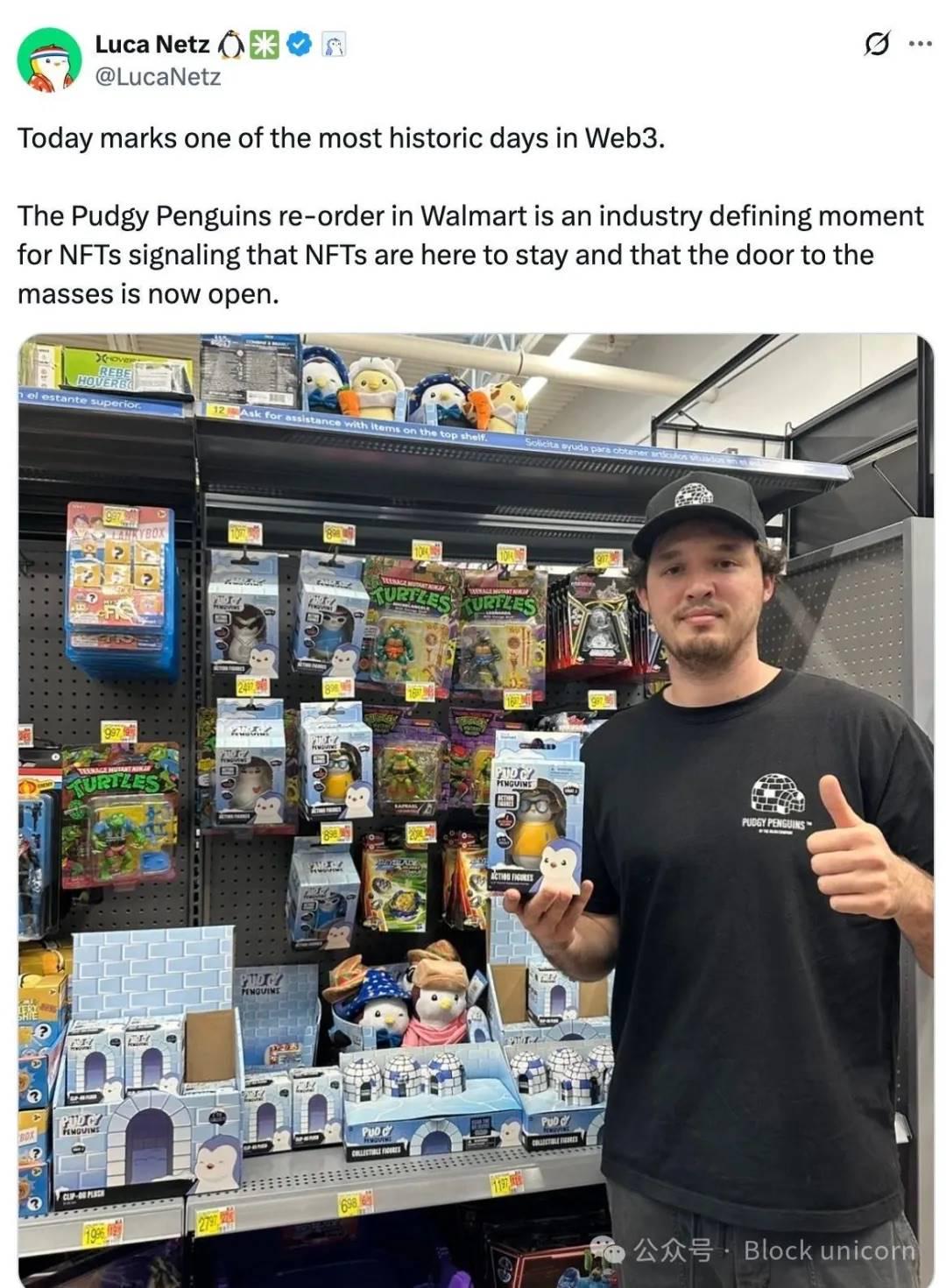
Token Issuance
On December 13, 2024, Netz airdropped $1.5 billion worth of PENGU tokens to millions of user wallets in the crypto ecosystem. This was the largest airdrop in Solana's history. He chose Solana for its lower transaction fees and higher throughput to maximize accessibility.
25.9% of the tokens are allocated to the Pudgy Penguin community, 24.12% allocated to other communities and newcomers, with the remainder distributed among team members (with lock-up periods), liquidity provision, and company reserves.
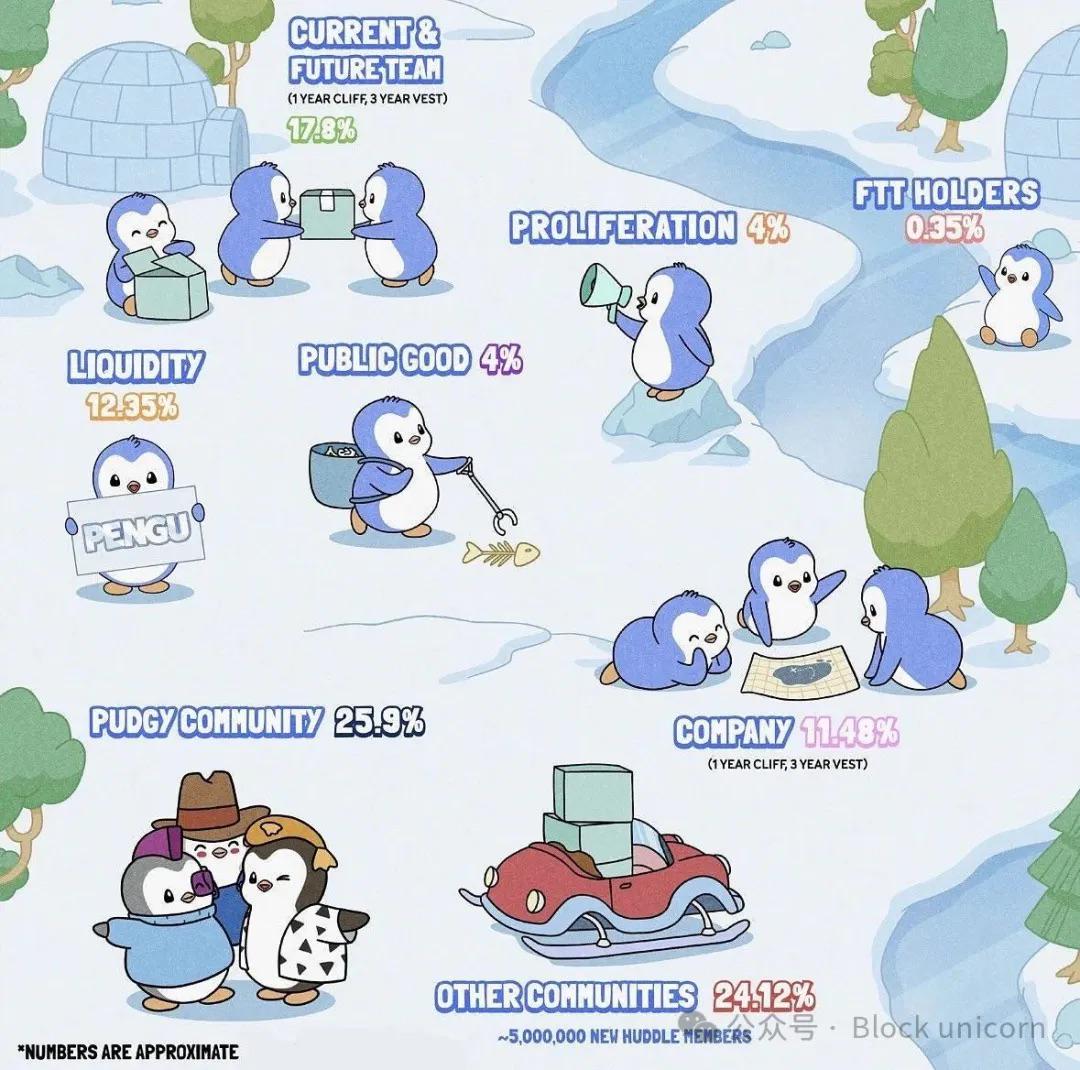
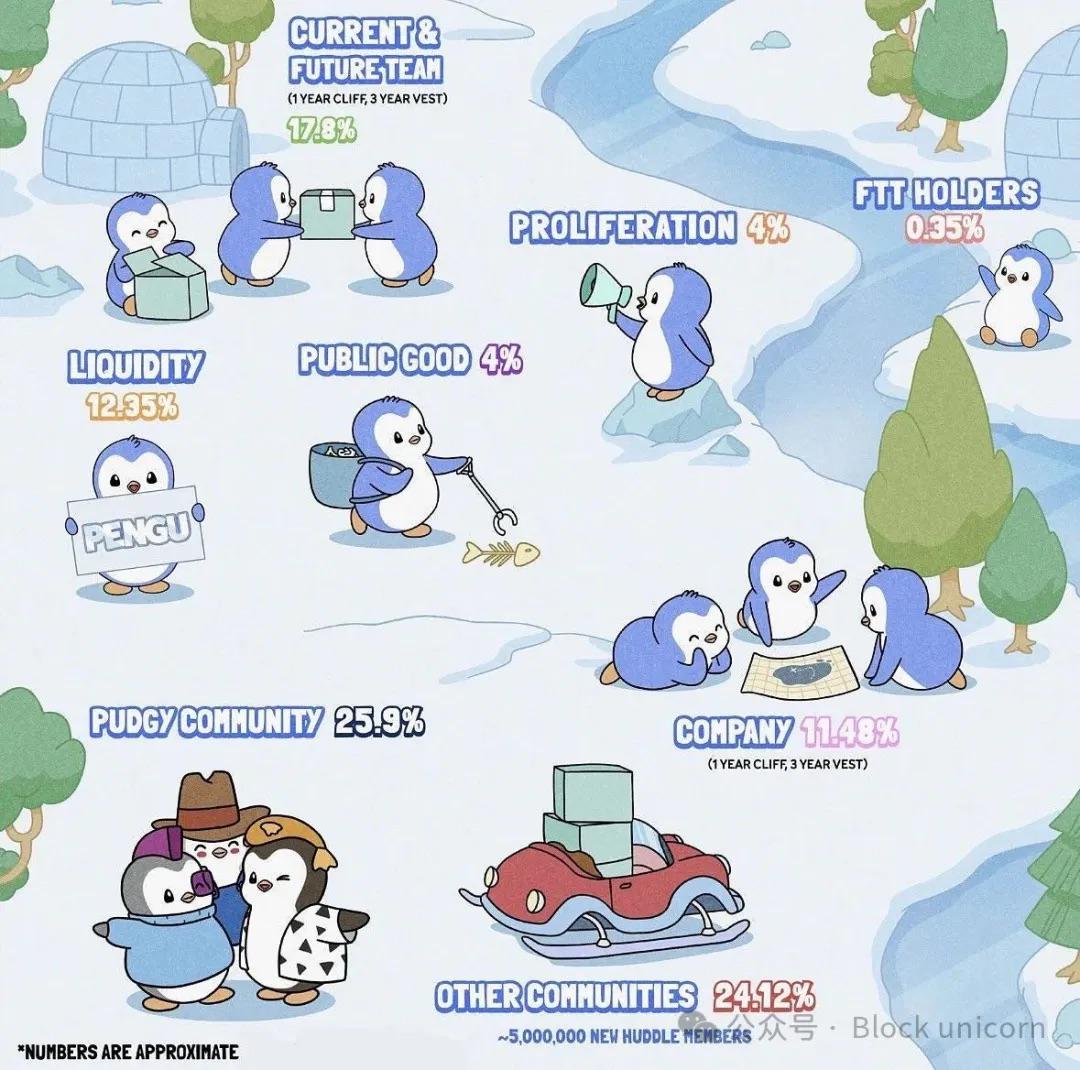
The issuance sparked intense debate in the crypto community. Some praised the broad distribution as democratizing the project's success. Others criticized distributing tokens to millions of wallets instead of concentrating rewards on long-term holders.
Netz defended this strategy: 'I’m not trying to issue a $2 billion token and then stop there forever. I’m chasing the real giants. I’m chasing Dogecoin.' He believes reaching a scale akin to that of mature meme coins like Dogecoin requires a release story that resonates with mainstream audiences.
Since its launch, PENGU's trajectory has validated some of Netz's bold predictions. When PENGU first debuted, it had a market cap of about $2.3 billion, then experienced the typical volatility of a large token issuance, first dropping significantly before ultimately finding support. The token consolidated for months between key price levels, setting the stage for subsequent large rebounds.
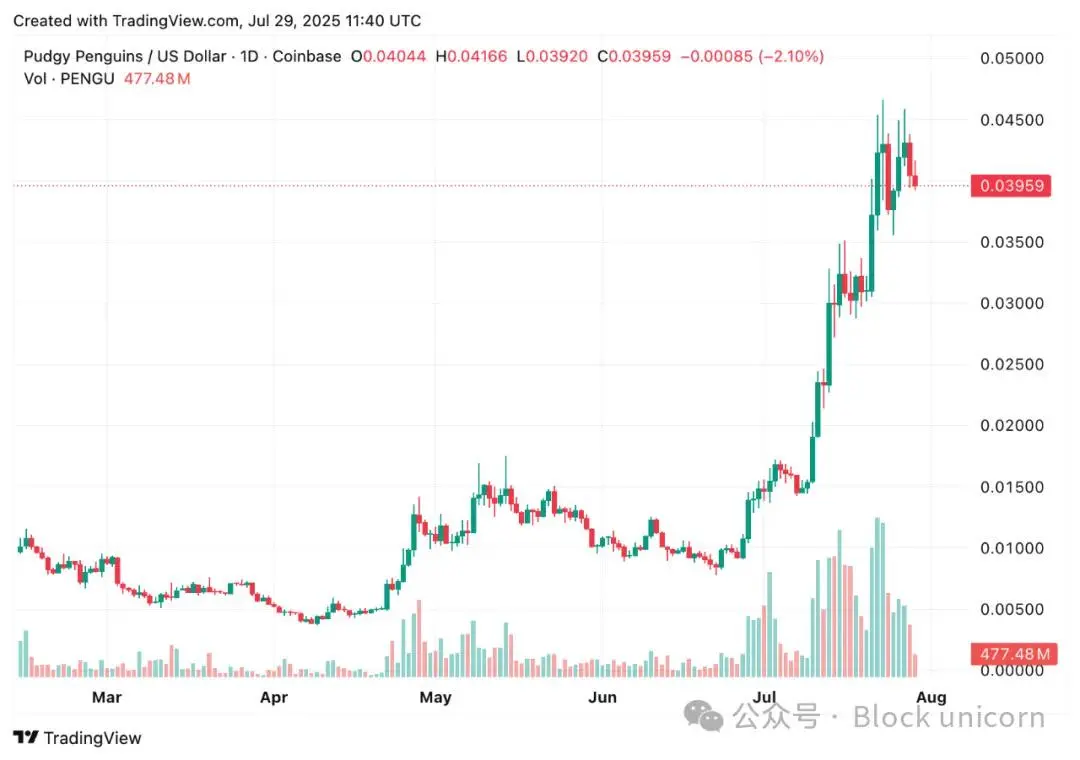
By mid-2025, as wealth accumulation among whales increases and daily trading volume breaks $2.5 billion, PENGU skyrocketed over 300% in just a few weeks, with a market cap exceeding $2.5 billion.
This surge was driven by multiple catalysts, showcasing the ecosystem's growing mainstream appeal. The most significant driver was Canary Capital's groundbreaking PENGU/NFT-themed ETF application submitted to the SEC. This institutional validation triggered massive FOMO in the market, indicating that traditional finance is beginning to pay attention to the Pudgy Penguins ecosystem. Whale accumulation provided the technical foundation for the rise, with whales acquiring over 200 million PENGU tokens since July, and the surge in trading volume reflecting strong interest from both institutional and retail investors.
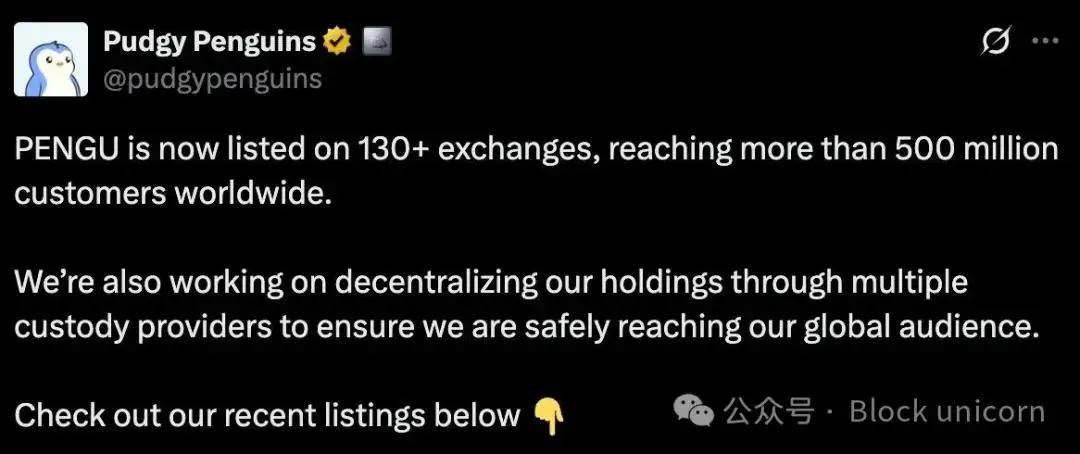
Strategic partnerships with mainstream brands, including NASCAR, Lufthansa, and Suplay Inc., brought unprecedented exposure beyond the crypto circle. Ongoing rumors about Pudgy Penguins potentially acquiring OpenSea further ignited speculation, although the team later denied these rumors.
Meanwhile, the original NFT series has maintained strong performance, with floor prices stabilizing between 15-16 ETH, significantly recovering from the bear market lows, validating Netz's strategy of building lasting value beyond short-term speculation.
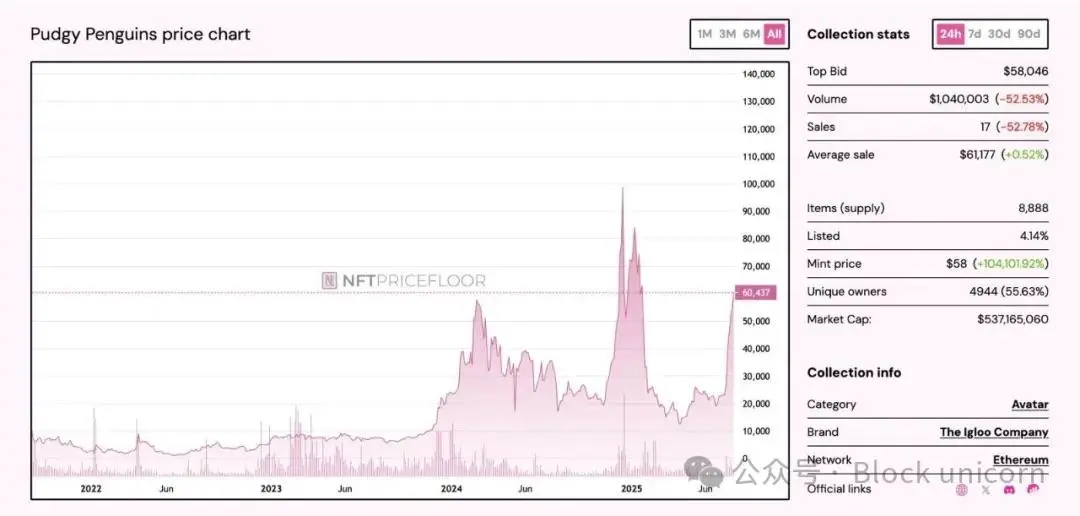
Building a Consumer Blockchain
In January 2025, Abstract launched what would become Netz's boldest bet yet: a blockchain that doesn’t feel like a blockchain. No wallet setup. No seed phrases to store. No gas fees to calculate. Users can start trading without even realizing they are using blockchain technology.
Netz believes that the blockchain itself is the least interesting part of Abstract. In his view, consumers will not go on-chain unless they have a reason to, and unless the friction is removed. Most importantly, he wants Abstract to be fun, allowing people to play games, collect digital items, and interact with applications without having to think about the underlying technology.
This vision attracted $11 million in investment from Founders Fund and other top investors. Abstract launched with over 100 applications, with another 400+ in development. These are not DeFi protocols or trading platforms, but games, music, sports, and fashion applications running on the blockchain.
This ambition reflects the person behind it. Netz works six days a week, twelve hours a day, from 8 AM to 8 PM, with no vacations. The only break is from 6 PM to 8 PM, which he calls 'critical thinking time,' used to process the day's tasks and plan the execution for tomorrow.
Abstract could become the platform that finally brings cryptocurrency to mainstream consumers. Or it could become another expensive lesson in the gap between vision and reality. For Netz, the discomfort of not knowing the outcome is precisely the point.
Future Vision
Netz has his own theory about the future. Traditional brands sell products to consumers, and the transaction ends at the cash register. NFTs completely reverse this model. What you get is not customers, but participants; not buyers, but stakeholders sharing in the success of the brand.
This mechanism creates unprecedented synergies. When Pudgy Penguin holders promote the brand, they automatically become investors protecting their own assets. When these toys hit the shelves at Walmart, every NFT holder is a winner. This is a form of capitalism that involves all participants.
But Netz wasn’t thinking about quarterly earnings. He was planning for decades. The full experience of Pudgy World, after 18 months of development, has already seen hundreds of thousands of accounts created and is about to launch. He plans to actively expand into the Asia-Pacific market, betting that the next wave of crypto enthusiasm will rise from the East.
25-year-old Luca Netz stands at the intersection of two worlds that shouldn’t collide. One is the chaotic speculative world of cryptocurrency, where fortunes can evaporate in minutes; the other is the slow-moving machine of traditional retail, where gaining shelf space at Walmart takes months of negotiation and a reliable track record.
Most people would choose a side, but Netz built a bridge.
He knows that the future is not about choosing between digital and physical, community and business, innovation and accessibility, but proving they were never opposites.
Every Pudgy Penguin toy sold at Target comes with a QR code that unlocks a digital world. Each transaction of the PENGU token represents a brand ownership that exists simultaneously in blockchain code and retail goods. Every Abstract user registered with just an email unwittingly steps into the future of finance.
This is Netz's revolution. Making the impossible inevitable. He didn’t disrupt the industry; he taught them to talk to each other.
In the brief history of cryptocurrency, most success stories follow a familiar arc: technological breakthroughs, venture capital, explosive growth, and eventual decline. Netz wrote a different script. He turned the industry’s greatest weakness—lack of transparency for ordinary people—into his competitive advantage.
Some entrepreneurs create companies. Others create movements. Netz created a new category of existence. Digital ownership feels as natural as holding a plush toy, and a global community forms around shared joy rather than common interests, with the most complex technology hidden behind the simplest experiences.



